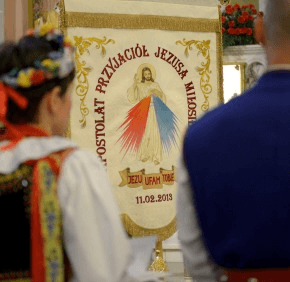ezygmont@CatholicReview
Twitter: @ReviewErik
The miraculous, however, was also close at hand for anyone in need of a little boost to their faith.
Lansdowne resident Joseph Hooe attended the liturgy – which included a bilingual Mass (English and Polish), a recitation of the Divine Mercy chaplet and a eucharistic procession inside the church – at the behest of his mother, Ann O’Neill.
As a young girl, she was suddenly cured of acute lymphatic leukemia on Good Friday in 1952 after a last-ditch pilgrimage to Emmitsburg and prayers to St. Elizabeth Ann Seton, then not yet canonized.
Hooe related the story as his mother waited in one of several lengthy lines to receive the sacrament of reconciliation, also a key feature of Divine Mercy Sunday.
“My mom goes to church every day, sometimes twice,” Hooe said. “There are doubters in this world, but she’s been touched – she knows God exists, and that there’s something beyond this life.”

Archbishop William E. Lori and Holy Rosary Church pastor, Society of Christ Father Ryszard Czerniak celebrate the April 3 Divine Mercy Sunday Mass. (Kevin J. Parks/CR Staff)
Quoting Venerable Fulton J. Sheen, Archbishop Lori said “the most dangerous sin in the world today is the denial of sin itself.”
“So many people,” the archbishop said, “think that sin and guilt are passé. ‘What’s right is what I think is right; what’s wrong is what I think is wrong. If it’s legal, it’s probably moral,’ so many people think today.”
He added that others believe that their difficult personal situations – whether they involve family or work – are simply beyond forgiveness.

A woman kneels in prayer following confession at Holy Rosary Church during the April 3 Divine Mercy Sunday celebration. The Fells Point parish is home of the Archdiocesan Shrine of the Divine Mercy. (Kevin J. Parks/CR Staff)
He added that Divine Mercy Sunday is an opportune time to overcome doubt.
“On this Mercy Sunday, through the lens of St. Faustina, Jesus is in our midst inviting us to touch his wounds,” Archbishop Lori said, referencing the Polish nun, canonized in 2000, responsible for inspiring the growing devotion to Divine Mercy, based on the visions she received of Jesus Christ in the 1930s.
Holy Rosary Parish, home of the Archdiocesan Shrine of the Divine Mercy, was integral to St. Faustina’s canonization. In 1995, then-pastor Father Ronald Pytel received miraculous healing of a heart condition after much devotion to then-Blessed Faustina and prayer for her intercession. Father Pytel died of kidney cancer in 2003.
Following the liturgy, the faithful were invited to venerate relics of St. Faustina, Blessed Father Michael Sopo?ko (her confessor and spiritual director) and St. John Paul II.
Concelebrants included Father Ryszard Czerniak of the Society of Christ, who took over as pastor of Holy Rosary in August. He told the Catholic Review the church had been offering a Divine Mercy Novena – each day of which the Chaplet of Divine Mercy is prayed – over the nine days prior to Divine Mercy Sunday.

Following the April 3 Divine Mercy Sunday celebration and Mass at Holy Rosary in Fells Point, those in attendance had the opportunity to venerate relics of Saints John Paul, II, Faustina Kowalska, and Michael Sopo?ko. (Kevin J. Parks/CR Staff)
The priest, who served in Chicago, Detroit and Atlanta before Baltimore, said he was deeply impressed by the apparent devotion in the faithful who established Holy Rosary in 1887 and a parish elementary school soon after.
“I see them as having two things that are important – God and the future for their children,” Father Czerniak said.
Father Czerniak also said that he is “impressed” by Holy Rosary’s current parishioners, as well as those who stop by for the sacrament of reconciliation and daily Mass on weekday evenings.
“For me, this is a sign people are looking for God,” he said. “I am looking at their faith, their worship and their prayer, and I can say I’m very happy to be here.”
Click here to see more photos or order prints.
Also see:
How to pray the Divine Mercy chaplet
Pope asks for new Catholic institutions of mercy, charity
Special report: Deep-rooted Polish faith faces secular challenge


